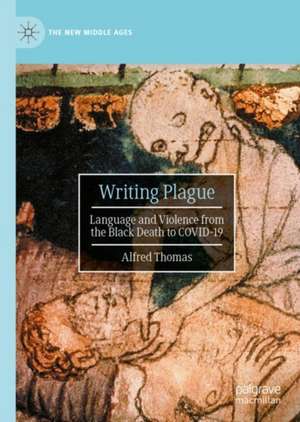Writing Plague: Language and Violence from the Black Death to COVID-19: The New Middle Ages
Autor Alfred Thomasen Limba Engleză Hardback – 23 apr 2022
| Toate formatele și edițiile | Preț | Express |
|---|---|---|
| Paperback (1) | 694.37 lei 6-8 săpt. | |
| Springer International Publishing – 23 apr 2023 | 694.37 lei 6-8 săpt. | |
| Hardback (1) | 629.09 lei 3-5 săpt. | +21.73 lei 6-12 zile |
| Springer International Publishing – 23 apr 2022 | 629.09 lei 3-5 săpt. | +21.73 lei 6-12 zile |
Din seria The New Middle Ages
- 20%
 Preț: 629.00 lei
Preț: 629.00 lei - 15%
 Preț: 636.80 lei
Preț: 636.80 lei - 20%
 Preț: 566.93 lei
Preț: 566.93 lei - 20%
 Preț: 690.00 lei
Preț: 690.00 lei - 15%
 Preț: 524.70 lei
Preț: 524.70 lei -
 Preț: 347.96 lei
Preț: 347.96 lei - 17%
 Preț: 457.56 lei
Preț: 457.56 lei - 9%
 Preț: 626.76 lei
Preț: 626.76 lei - 8%
 Preț: 537.27 lei
Preț: 537.27 lei - 8%
 Preț: 563.61 lei
Preț: 563.61 lei -
 Preț: 303.51 lei
Preț: 303.51 lei -
 Preț: 389.70 lei
Preț: 389.70 lei -
 Preț: 390.63 lei
Preț: 390.63 lei -
 Preț: 380.45 lei
Preț: 380.45 lei -
 Preț: 385.62 lei
Preț: 385.62 lei -
 Preț: 390.25 lei
Preț: 390.25 lei -
 Preț: 385.25 lei
Preț: 385.25 lei - 5%
 Preț: 712.81 lei
Preț: 712.81 lei - 15%
 Preț: 640.06 lei
Preț: 640.06 lei -
 Preț: 398.15 lei
Preț: 398.15 lei -
 Preț: 393.35 lei
Preț: 393.35 lei - 15%
 Preț: 697.97 lei
Preț: 697.97 lei -
 Preț: 388.72 lei
Preț: 388.72 lei -
 Preț: 387.96 lei
Preț: 387.96 lei - 15%
 Preț: 579.20 lei
Preț: 579.20 lei -
 Preț: 391.40 lei
Preț: 391.40 lei - 18%
 Preț: 725.13 lei
Preț: 725.13 lei - 18%
 Preț: 724.17 lei
Preț: 724.17 lei -
 Preț: 388.90 lei
Preț: 388.90 lei - 15%
 Preț: 698.30 lei
Preț: 698.30 lei -
 Preț: 386.39 lei
Preț: 386.39 lei -
 Preț: 387.38 lei
Preț: 387.38 lei -
 Preț: 384.48 lei
Preț: 384.48 lei - 18%
 Preț: 726.69 lei
Preț: 726.69 lei -
 Preț: 385.08 lei
Preț: 385.08 lei - 15%
 Preț: 639.14 lei
Preț: 639.14 lei -
 Preț: 388.72 lei
Preț: 388.72 lei -
 Preț: 387.20 lei
Preț: 387.20 lei -
 Preț: 389.11 lei
Preț: 389.11 lei - 15%
 Preț: 640.24 lei
Preț: 640.24 lei - 15%
 Preț: 499.92 lei
Preț: 499.92 lei - 15%
 Preț: 640.37 lei
Preț: 640.37 lei - 15%
 Preț: 641.71 lei
Preț: 641.71 lei -
 Preț: 384.70 lei
Preț: 384.70 lei - 15%
 Preț: 694.37 lei
Preț: 694.37 lei - 15%
 Preț: 697.47 lei
Preț: 697.47 lei
Preț: 629.09 lei
Preț vechi: 786.36 lei
-20% Nou
Puncte Express: 944
Preț estimativ în valută:
120.38€ • 125.44$ • 99.67£
120.38€ • 125.44$ • 99.67£
Carte disponibilă
Livrare economică 13-27 martie
Livrare express 26 februarie-04 martie pentru 31.72 lei
Preluare comenzi: 021 569.72.76
Specificații
ISBN-13: 9783030948498
ISBN-10: 3030948498
Pagini: 265
Ilustrații: XXIV, 265 p. 32 illus., 30 illus. in color.
Dimensiuni: 148 x 210 x 23 mm
Greutate: 0.5 kg
Ediția:1st ed. 2022
Editura: Springer International Publishing
Colecția Palgrave Macmillan
Seria The New Middle Ages
Locul publicării:Cham, Switzerland
ISBN-10: 3030948498
Pagini: 265
Ilustrații: XXIV, 265 p. 32 illus., 30 illus. in color.
Dimensiuni: 148 x 210 x 23 mm
Greutate: 0.5 kg
Ediția:1st ed. 2022
Editura: Springer International Publishing
Colecția Palgrave Macmillan
Seria The New Middle Ages
Locul publicării:Cham, Switzerland
Cuprins
1. Introduction: Language and Violence from the Black Death to COVID-19.- 2. The Pardoner, the Prioress, and the Pandemic: Jews and Other Scapegoats in Fourteenth-Century European Culture.- 3. Death and the Maiden: Mourning and Melancholy in Pearl and the Late Medieval European Elegy.- 4. The Plague’s The Thing: Pandemic and Religious Politics in Shakespeare’s Drama.- 5. The Brown Plague and the White Sickness: Fascism and the Crisis of Democracy in Twentieth-Century Plague Fiction and Film.- 6. Conclusion.
Notă biografică
Alfred Thomas is Professor of English at the University of Illinois at Chicago, USA. He has published ten books on various aspects of European and English literature from the later Middle Ages to Shakespeare.
Textul de pe ultima copertă
Writing Plague: Language and Violence from the Black Death to COVID-19 brings a holistic and comparative perspective to “plague writing” from the later Middle Ages to the twenty-first century. It argues that while the human “hardware” has changed enormously between the medieval past and the present the human “software” has remained remarkably similar across time. Through close readings of works by medieval writers like Guillaume de Machaut, Giovanni Boccaccio, and Geoffrey Chaucer in the fourteenth century, select plays by Shakespeare, and modern “plague” fiction and film, Alfred Thomas convincingly demonstrates psychological continuities between the Black Death and COVID-19. Thomas highlights the danger of scapegoating vulnerable minority groups such as Asian Americans and Jews in today’s America. This wide-ranging study will thus be of interest not only to medievalists but also to students of modernity as well as the general reader.
Caracteristici
Argues that reactions to pandemics between the middle ages and the present have largely remained the same Analyzes the current resurgence of anti-semitism while also examining a history of violence towards minorities Traces a transhistorical and transcultural pandemic discourse
